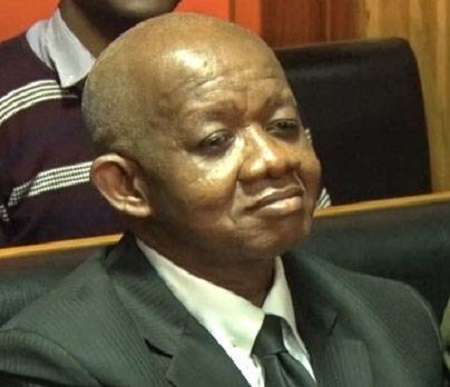
Justice Adeniyi Ademola
Facts have emerged that Justice Adeniyi Ademola, who was recently cleared controversially of corruption charges by a court and recalled by the National Judicial Council (NJC) to resume sitting at the Federal High Court, Abuja, had previously been reported to the NJC for a series of professional misconduct.
Displeased by his handling of a case assigned to him, the Committee of Anambra State Peoples Democratic Party (PDP) House of Representatives Members-elect had petitioned the NJC, accusing Justice Ademola of corruption, judicial impertinence, miscarriage of justice, bias and of reading in the open court a judgment different from the written one.
Dated 14 July 2016 and addressed to the NJC Chairman, the petition, exclusively obtained by SaharaReporters, refers to the case between Senator Annie Okonkwo & 43 others Vs Independent National Electoral Commission and 22 others (Suit No. FHC/ABJ/CS/177/2015).
A major source of irritation to the petitioners was Justice Ademola’s decision to read in the open court, on 8 July 2016, a judgment at variance with the written one, the certified true copy of which was made available five days after he delivered judgment in the suit.
According to the petitioners, the suit, filed on 17 February 2015, was initially assigned to the late Justice E.S Chukwu. But on 20 March 2015, following an application by some of the defendants that Justice Chukwu should disqualify himself, the matter was transferred to Justice Ademola. The same day, Justice Ademola took submissions of the petitioners’ lead counsel, Mr. Assam Assam (SAN) and that of the first defendant, Mr. Onyechi Ikpeazu (SAN) on the issues for determination.
The petitioners’ counsel and those of the 22 defendants arrived at a sole issue for determination: “Whether INEC is competent to remove, delete, replace or substitute the names of a nominated candidate for election after publication of same and after the expiration of the time limited for substitution of candidates when that nomination and publication were compelled by a judgment of court, which was subsequently nullified by the Court of Appeal, Abuja.”
The nullified court order, noted the petitioners, was made in a case (Suit No. FHC/ABJ/CS/854/2014) and CA/A/737/2014).
Lawyers to the plaintiffs and defendants subsequently made oral submissions and adopted briefs for judgment, which was reserved for 23 March 2015.
But instead of delivering the judgment on the reserved date, said the petitioners, Justice Ademola adjourned the matter without an appointed date, ruling: “After a careful perusal of above-mentioned documents and exhibits herein, this court is of the opinion that the issue(s) at stake is list of PDP candidates for Anambra State for general elections 2015, the subject of matter of appeals in the Supreme Court in SC/37/2015 and SC/29/2013. The hearing of the said appeals in the court is fixed for some time in June 2015 and it would amount to judicial rascality or impertinence to seek to determine the same issue(s) in this new suit by this court. This court will not do so in the circumstances. Accordingly, this court hereby orders a stay of proceedings in this suit pending the outcome of the appeals at the Supreme Court.”
What followed was that on 29 January 2016, the Supreme Court ruled on both appeals, setting aside the Appellate Court decision to allow grounds of appeal. Again, on 24 February 2016, the apex court dismissed INEC’s application for clarification of judgment in SC.37/2015 for lack of jurisdiction.
During the pendency of judgment in the two appeals before the Supreme Court, the petitioners said, Justice Ademola took up two pre-election matters from Anambra State. Both were related to the nomination of PDP candidates in the state.
One (FHC/ABJ/254/2015) was between Ms. Lynda Chuba Ikpeazu and the PDP, while the other (FHC/ABJ/CS/254/2015) was between Mrs. Margery Okadigbo and PDP with three other defendants, including Ms. Stella Oduah.
Ms. Oduah and Mrs. Okadigbo, incidentally, were the 4th and 12th defendants respectively in the suit filed by the petitioners.
The Committee of Anambra State House of Representatives Members-elect alleged that perfidy permeated the suit between Ms. Ikpeazu and PDP. The suit commenced on 18 March 2015 by originating summons and was concluded within seven days after filing, despite starting long after the petitioners’ suit dealing with similar issues.
“The circumstances surrounding this particular suit and the unprecedented speed with which it was handled raised many eyebrows,” raged the petitioners.
They noted that Mr. Ikpeazu (SAN) a member of INEC’s legal team in the petitioners’ suit, was also counsel to Ms. Ikpeazu, his blood sister.
The petitioners said they found it alarming that on the same day that Justice Ademola adjourned their matter indefinitely, he allowed oral arguments on the same issues of PDP candidates, adopted written addresses and reserved judgment. This, claimed the petitioners, was done to enable Ms. Ikpeazu be in line to claim PDP’s electoral victory.
On 25 June 2016, Justice Ademola delivered judgment, making both declaratory reliefs and ancillary orders in favor of Ms. Ikpeazu without waiting for the outcome of the suit pending at the Supreme Court.
He ordered INEC to issue a certificate of return to Ms. Ikpeazu as a member of the House of Representatives representing Onitsha North/South Federal Constituency and directed that she be sworn in by the Speaker of the House of Representatives and Clerk of the National Assembly.
The petitioners demanded a probe into the role of Justice Ademola and Mr. Ikpeazu in the matter.
“No new issue(s) was introduced by Justice Ademola in Suit No. FHC/ABJ/254/2015. Rather, the matter was concluded before the election and judgment delivered after the election. There is a conflict of interest manifested by Dr. Ikpeazu as a member of the INEC legal consortium in appearing both as counsel to INEC in Suit No. FHC/ABJ/CS/177/2015, splitting junior counsels from his chambers to represent various defendants while appearing for his sibling, Ms. Ikpeazu, with same junior counsels in FHC/ABJ/CS/254, thereby compromising INEC,” stated the petitioners.
They alleged that Justice Ademola was aware of the inappropriateness of the conduct, but chose to ignore it because it was in line with their agreed goal. They also stated that the judge and Mr. Ikpeazu have been family friends for a long time and have used that relationship to the disadvantage of litigants, who failed to hire their mutually beneficial service.
Bias was a major theme in the petitioners’ complaints against Justice Ademola. According to them, the motion on notice filed on 1 June 2015 to seek an order setting aside the order for stay of proceedings pending the determination of the appeals before the Supreme Court were not considered by the judge.
The motion, said the complainants, was filed before Justice Ademola gave judgment in favor of Ms. Ikpeazu. The plaintiffs also recalled that INEC had admitted under oath in a counter-affidavit filed in a suit that only one primary election was held by the PDP in Anambra State, where they emerged candidates for the 2015 elections. They added that the motion made it clear that their matter was different from the two facing appeals before the Supreme Court.
The complainants pointed out that in his ruling on 25 March 2015, Justice Ademola held that the stay was necessary, as the issue before the Supreme Court was on the list of candidates, but made a U-Turn in his judgment of 8 July 2016 that the apex court did not deal with the list of candidates.
“Our motion on notice was filed on 1 June 2015. The Supreme Court had on 29 January 2016 delivered judgment in SC.37/2015. The court allowed the appeal, set aside the judgment of the Court of Appeal in CA/A/737/2014. On 3 February, the judgment of the Supreme Court in SC.37/2015 was filed before Justice Ademola for determination of FHC/ABJ/CS/177/2015. The court adjourned the matter to 25 March 2016,” recalled the complainants.
On 13 June 2016, they wrote to the Chief Judge of the Federal High Court to prevail on Justice Ademola to deliver judgment on their matter. This was done because Justice Ademola had failed to deliver judgment well over than 90 days after the Supreme Court judgment in SC.37/2015.
Justice Ademola, said the petitioners, declined to give judgment. Instead, he elected to reopen the matter to allow a PDP faction to introduce fresh issues through Mr. Emeka Etiaba, who filed new processes rather than re-adopt already filed and adopted briefs by the all the counsels on 23 March 2015. Mr. Etiaba’s letter of engagement was signed by Messrs. Ahmed Makarfi and Ben Obi, then PDP National Caretaker Committee Chairman and Secretary respectively. Another lawyer, Mr. Ifeanyi Umeji, also appeared for the PDP, with his letter of engagement co-signed by Messrs. Modu Ali Sheriff and Wale Oladipo, PDP National Chairman and National Secretary respectively. Mr. Umeji tendered a letter of disengagement of Mr. Etiaba. This was signed by Messrs. Sheriff and Oladipo. Mr. Olusola Oke, another lawyer, also appeared for the PDP. Justice Ademola, however, ruled in Mr. Etiaba’s favor and reserved judgment for 25 March 2015.
“Justice Ademola formulated three additional issues for determination, which are not in line with the original issues formulated by the plaintiffs and defendants when they adopted their briefs on 23 March 2015. On 29 June, counsels adopted their briefs and judgment was reserved for 8 July 2016, five months after the Supreme Court judgment.
What transpired on the appointed date was that Justice Ademola read in the open court a judgment that conflicted with the written one.
According to the petitioners, the judge contradicted himself on many fronts.
The entire content of Paragraph 2, page 12 of Justice Ademola’s judgment read: “From the affidavit evidence and exhibits before the court as well as submissions of counsels, particularly Dr. O Ikpeazu, 1st defendant, INEC, acted completely competently in removing, deleting, replacing or substituting the plaintiffs for election pursuant to the Court of Appeal, Abuja Division, judgment of 6/2/15 with 2nd -22nd defendants as PDP candidates for the state/National Assembly elections of 28/3/15 &11/4/15 in respect of Anambra State.”
This portion, said the petitioners, was smuggled into the written judgment, as they were not pronounced upon in the open court.
The smuggling of the portion, claimed the petitioners, was done in reaction to their Notice of Appeal served on 11 July 2016, challenging Justice Ademola’s pronouncement in the open court. The claimed to have in their possession an audio recording of the court proceedings on that day.
In the open court of 8 July 2016, the petitioners noted that Justice Ademola, while delivering judgment, said:“Orders in FHC/ABJ/CS/854/2014 relating to the plaintiffs as candidates of the 17thdefendant (PDP) are no longer valid.” However, in the written judgment, he stated: “Orders 4 &5 made in FHC/ABJ/CS/854/2014 on 5/12/14 referring to the plaintiffs as candidates of the 17thdefendant is of doubtful validity.
They described the judge’s discrepant pronouncements as a laughable afterthought, wondering why he considered the first issue as inadequate in determining the suit and then using it to determine the matter, when he claimed that INEC acted competently.
Another discrepancy in the judgments, observed the petitioners, is connected with Justice Ademola pronouncing two different people as candidates of the same party for the same election in the same constituency.
In an earlier judgment, he had held that the 2nd to the 16th defendants were candidates of the PDP, a pronouncement that conflicted with one he later gave, where he held that the 2nddefendant (Mr. Andy Uba) and the 10th defendant (Chukwumaeze Nzeribe) were both contestants for the office of Senate in the same Anambra South Senatorial Zone. They wondered how the two could be candidates of the same party in the same election.
Also identified was the part relating to Ms. Oduah and Mrs. Okadigbo, who were rival contestants in the Anambra North Senatorial District. Both were parties in another suit before Justice Ademola. Mrs. Okadigbo lost the case on grounds of jurisdiction. Yet, both were declared as validly nominated PDP candidates by Justice Ademola in the petitioners’ case.
This was in spite of Mrs. Okadigbo’s admission that she did not participate in any primary election. Mr. Obiora Okonkwo and Mrs. Uche Ekwunife, rival candidates Anambra Senatorial District and defendants in the petitioners’ case, who had a pending suit before Justice Abdul Kafarati, were also declared validly elected by Justice Ademola.
The petitioners also invited the NJC’s Chairman’s attention to Justice Ademola’s failure to abide by constitutional provisions dealing with enforcement of court decisions, which state that judgments and orders of court are to be obeyed until vacated by a superior court of record. They pointed to page 20 of his judgment, where he said: “In view of the judgment and ruling of the Supreme Court delivered on 29/1/16 &24/2/16 herein before mentioned, Orders 4&5 made in FHC/ABJ/CS/854/14 on 5/12/14 referring to the plaintiffs and candidates of 17th defendant (PDP) are of doubtful validity in the circumstances.”
The petitioners noted that the only superior order against the judgment in that suit was the Court of Appeal judgment, which was set aside by the Supreme Court judgment delivered by Justice Okoro. They wondered why Justice Ademola could not abide by the judgment of the superior court, being the only in respect of the suit.
Also found inconsistent were pronouncements on page 12, line 7 to 13 and page 19, lines 3 and 4.
In the former, Justice Ademola stated: “From the affidavit evidence and exhibits before the court as well as submissions of counsels, particularly Dr. Ikpeazu, the 1st defendant (INEC) acted competently in removing, deleting, replacing, or substituting the plaintiffs for election pursuant to the Court of Appeal, Abuja Division, judgment of 6/2/15 with the 2nd -22nd defendants as PDP candidates for state/National Assembly elections of 28/3/15 and 11/4/15 in respect of Anambra State.”
In lines 3 and 4 of the latter, Justice Ademola quoted the Supreme Court judgment in SC.37/2015, saying: “The judgment of the Court of Appeal is hereby set aside.”
The plaintiffs said Justice Ademola was being mischievous, given that the Supreme Court had set aside the Appeal Court ruling five months before he gave his judgment.
“If the defendants became candidates by the order of Court of Appeal, Abuja, that order has long been set aside by the superior court, so their candidature has evaporated and since ceased to be legal,” said the petitioners.
They called on the NJC to institute disciplinary actions against Justice Ademola for the alleged misconduct.
Justice Ademola was recently discharged by the Federal High Court of the Federal Capital Territory of all 18-count charges of fraud brought against him, his wife and a senior lawyer.
The judge, his wife, Olabowale and Mr. Joe Agi (SAN), were accused of fraudulent diversion of huge sums, ranging from local and foreign currencies, possession of firearms and involvement in bribe taking.
Justice Ademola and his wife, a former Head of Service of Lagos State, were accused of abusing their offices by collecting bribes.
Justice Jude Okeke, who presided over the matter, said the prosecution failed to prove its allegation, stating that the case against the judge and his wife were built on speculations. According to Justice Okeke, the prosecution failed to prove that the N10 million transferred to Justice Ademola’s wife by Mr. Agi was offered as an illegal inducement.
He also said the allegation that N30 million was given as an inducement to Justice Ademola was limp because the prosecution witnesses admitted not knowing the purpose for which the money was given.
On the allegation of embezzling huge sums of foreign and local currencies, Justice Okeke said the prosecution witness admitted that judges are entitled to estacodes, usually given in foreign currencies, especially American dollars.
Justice Ademola and five other judges were last year, suspended by the NJC, following a Department of State Service (DSS) crackdown on judicial corruption.
Source: Sahara Reporters



0 Comments